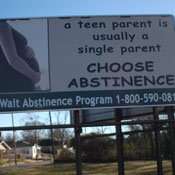School advocacy groups and parents are beginning to talk about how they can influence Jackson Public Schools' sex-education policy next year.
The state Legislature passed a bill in March that requires Mississippi school districts to adopt either an abstinence-only or abstinence-plus sex-education policy. House Bill 999 gives school boards until June 30, 2012, to adopt a policy and requires them to implement it in the 2012-2013 curriculum.
Sanford Johnson, deputy director of Mississippi First, an education policy group, spoke yesterday at a Parents for Public Schools lunch at the Jackson Medical Mall. He said his organization was somewhat blindsided by how watered down and vague the bill was when it came through the House and Senate. Neither policy allows schools to teach students how to use condoms, although they are allowed to discuss condoms and contraceptives if the presentation includes information about their risks and failure rates.
"[Students] come away from the program going, 'Well, if condoms don't work, why am I wasting my time?' Especially when there's a two-for-one sale on Mountain Dew at Walmart," Johnson said.*
Even though the bill does not provide funding for school districts to implement a sex-education policy, Johnson said districts that choose abstinence-plus policies can get federal funding for curricula and training. Mississippi First worked with the state Department of Health to get $2 million in grants for schools that implement curricula from its Creating Healthy and Responsible Teens Initiative. Mississippi First began creating this material last year, but has now adapted it so that it will be in line with House Bill 999's requirements. The Department of Health has approved a list of abstinence-plus curricula, but the Department of Education will still have to approve them.
Johnson said Benton, Marshall, Coahoma and Tunica counties have already adopted abstinence-plus policies.
Susan Womack, executive director of Parents for Public Schools of Greater Jackson, said her organization is encouraging parents to let school-board members know what kind of sex-education policy they want in their district. As far as JPS is concerned, Womack said the local Parents for Public Schools chapter supports an abstinence-plus policy.
"So far we don't have any data that ... abstinence-only works," she said. "The data shows in some cases that with abstinence-only, the numbers go up. In other words, it accomplishes exactly the opposite of what it's meant to accomplish."
Tonja Murphy, a parent who was at the lunch and is involved with Parents for Public Schools, said she wants to see Jackson schools adopt curricula with a component to get parents involved, in part because students are not the only ones who need to know about safe sex.
"Parents are going to need to know some of the same information," she said.
The Women's Fund of Mississippi released a study last month that shows the state's high teen birth rate costs the state's taxpayers $155 million each year. In 2008, the Centers for Disease Control found that Mississippi's teen birth rate was the highest in the nation.
The Women's Fund report suggested comprehensive sex education, mentorships and youth employment opportunities as tactics for reducing the teen pregnancy rate.
*CLARIFICATION: Apparently there is a rumor that drinking Mountain Dew lowers sperm count and therefore prevents pregnancy. That may have what Johnson was referring to.



Comments
Use the comment form below to begin a discussion about this content.